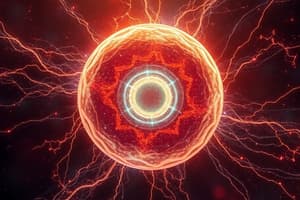Podcast
Questions and Answers
What is the origin of the term “atom”?
What is the origin of the term “atom”?
- It comes from the Greek word for indivisible, because it was once thought that atoms were the smallest things in the universe and could not be divided. (correct)
- It comes from the Arabic word for essence, because atoms are the fundamental components of all matter.
- It comes from the Latin word for invisible, because atoms cannot be seen by the naked eye.
- It comes from the Sanskrit word for eternal, because atoms are indestructible and immutable.
Which of the following statements is correct when referring to the atom?
Which of the following statements is correct when referring to the atom?
- The number of protons determines the atomic number and the number of electrons determines the atomic mass.
- The number of protons and neutrons determines the atomic mass and the number of electrons determines the charge.
- The nucleus contains protons and electrons, and the electrons orbit around the nucleus.
- The nucleus contains protons and neutrons, and the electrons occupy shells around the nucleus. (correct)
What is the difference between an atom and an element?
What is the difference between an atom and an element?
- An atom is a type of energy, while an element is a type of matter that has specific chemical and physical properties.
- An atom is indivisible, while an element can be further divided into smaller particles.
- An atom is a single particle of matter, while an element is a collection of atoms that have the same number of protons. (correct)
- An atom is a fundamental component of all matter, while an element is a collection of atoms with different numbers of protons.
What is the name of the force that holds the nucleus together and the energy associated with this force?
What is the name of the force that holds the nucleus together and the energy associated with this force?
Which of the following statements is true about the atomic, mass, and neutron number of an element?
Which of the following statements is true about the atomic, mass, and neutron number of an element?
What is the name of the force that is carried by protons and neutrons and holds the nucleus together?
What is the name of the force that is carried by protons and neutrons and holds the nucleus together?
What is the name of the force that causes the protons to repel each other due to their positive charge?
What is the name of the force that causes the protons to repel each other due to their positive charge?
What is the role of neutrons in stabilizing the nucleus?
What is the role of neutrons in stabilizing the nucleus?
What is the problem with a simple nucleus composed of two protons?
What is the problem with a simple nucleus composed of two protons?
Flashcards are hidden until you start studying




